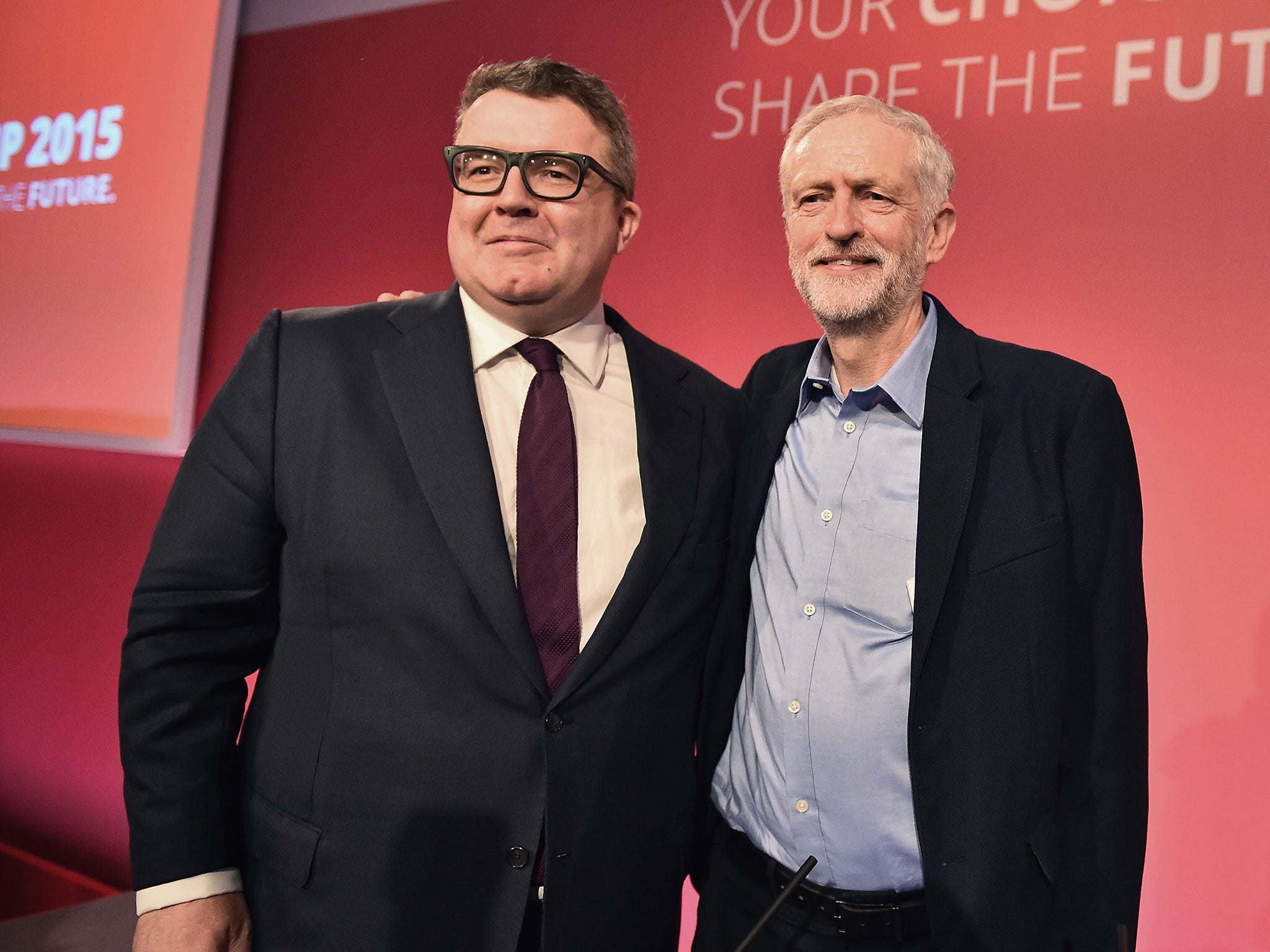Jeremy Corbyn already at odds with deputy Tom Watson over Trident, Nato and the EU
Mr Watson stressed he had his own mandate to drive through reform

As Jeremy Corbyn began work on appointing his Shadow Cabinet, policy tensions within Labour’s top team were laid bare by the new deputy leader, Tom Watson, who admitted they were at odds over the replacement of Trident, Nato membership and whether to leave the European Union.
Mr Watson, who achieved a convincing victory over his rivals, stressed he had his own mandate to drive through reform of the party. He said there was “zero chance” of an attempt by moderate MPs to oust the left-winger from the leadership and insisted he was relaxed about the numbers of prominent Labour MPs quitting the party’s front bench.
Despite his overwhelming victory, Mr Corbyn faces a daunting task in rallying behind him a Parliamentary Labour Party which overwhelmingly opposed his leadership. His problems in appealing for loyalty are exacerbated by his reputation as a serial rebel under previous Labour leaders who defied the party whip more than 500 times as an MP.
Shabana Mahmood became the latest senior figure to rule out serving under Mr Corbyn as she stepped down as the shadow Chief Secretary to the Treasury, to bring the total number of resignations to eight.
Mr Corbyn has met his defeated leadership rival Andy Burnham in the Commons, prompting speculation he could be appointed shadow Foreign Secretary.
The identity of his shadow Chancellor will be a key decision for the new party leader, with the shadow Commons leader Angela Eagle and his left-wing ally John McDonnell believed to be in the frame for the job.
Mr Corbyn demonstrated his unorthodox approach to his new post by turning down an invitation to appear on BBC1’s Andrew Marr Show and leaving Mr Watson to deputise for him. Instead he attended an event in his Islington North constituency before heading to Westminster to start work on his front-bench appointments ahead of a busy parliamentary week.
In his interview, Mr Watson acknowledged that a series of major policy issues threatened to strain Labour unity in coming months. The new leader placed opposition to renewing the Trident nuclear missile system at the heart of his leadership campaign, overturning Labour’s position under previous leaders.
But Mr Watson signalled he would resist any attempt by the new leader to swing Labour behind an anti-Trident stance. “I think the deterrent has kept the peace in the world for half a century and I hope we can have that debate in the party,” he told Andrew Marr.
“We have got to find ways of alighting on policy, and if you’re a democratic party you’ve got to have that debate and I’m sure Trident is one of those issues where we’ll do that.”
Mr Corbyn has previously backed Britain’s withdrawal from Nato, but recently modified his position to say he wanted a “serious debate” on its powers as there was little appetite to leave.
Mr Watson conceded that he did not know “precisely what Jeremy’s position” was on Nato membership, but added: “I aim to convince him of the merits of Nato.”
Mr Corbyn has refused to rule out campaigning for Britain to leave the European Union in the referendum promised by David Cameron by the end of 2017.
But his new deputy said: “I will be ‘Yes to Europe’ definitely and I hope we can convince the Labour Party, those sceptics in the Labour Party, that that is where Labour needs to be in the referendum.”
One of Mr Corbyn’s key allies, Diane Abbott, moved to reassure his internal party critics that he would not seek Britain’s exit from Nato or the EU. But she made clear he favoured scrapping the proposed replacement for Trident.
“I can say with confidence Jeremy is not taking us out of Nato and he is not taking us out of the EU. Those are red herrings,” she said.
“If they [Labour MPs] have some passionate commitment in principle to nuclear weapons there may be a difficulty for them with a Jeremy Corbyn leadership.
“If they have a passionate commitment to nuclear weapons they will find themselves out of step with the new Labour Party.”
The Blairite former minister Lord Mandelson said Mr Corbyn’s victory was a “leap backwards” for the party.
“We may not see an immediate, dramatic collapse,” he wrote in The Sunday Times. “Many voters may even be attracted initially by Corbyn’s populism and anti-Establishment pitch. But that is not the same as deciding he should be Britain’s next prime minister.
“The danger is that Labour simply decides to muddle through, resigning ourselves to our fate rather than doing anything to alter it.
David Blunkett, the former Home Secretary, warned against a return to the 1980s when moderate MPs faced the prospect of being deselected by left-wing activists.
“I am deeply concerned about the people around him. I am very worried about the direction, but I do not want people to engage in a putsch. I want him to be given the time to demonstrate his leadership qualities and the ability to be able to pull people together – not just within the Labour Party, but, more crucially across the country,” Mr Blunkett said.
David Cameron signalled the start of an onslaught on his new opponent’s policies, warning that Labour now posed “a threat to our national security, our economic security and your family’s security”.
Join our commenting forum
Join thought-provoking conversations, follow other Independent readers and see their replies
Comments